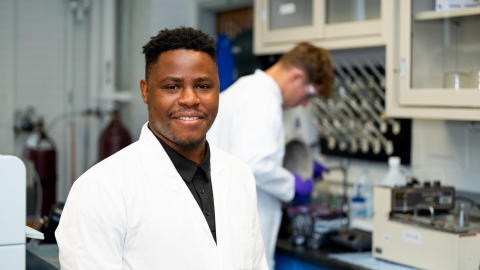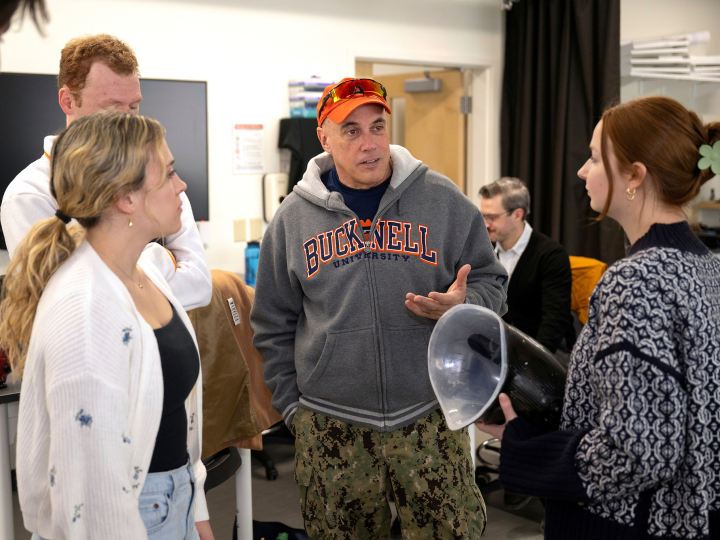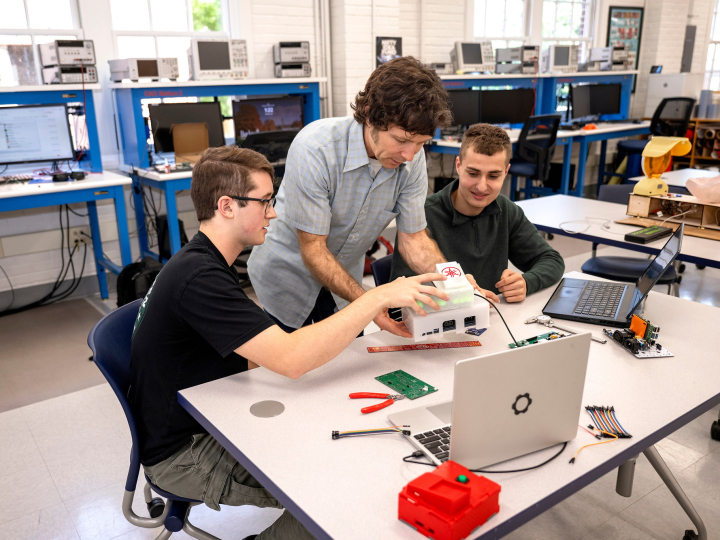
Bucknell Professor Jude Okolie Harnesses AI to Assess Sources of Biodiesel Fuel
October 15, 2025
Professor Jude Okolie, chemical engineering, provides students with research opportunities in his lab, such as how lithium battery recycling can create a more sustainable future. Photo by James T. Giffen, Marketing & Communications
A recent study co-authored by Bucknell University Professor Jude Okolie, chemical engineering, highlights how artificial intelligence (AI) may hold the key to a more sustainable future for biodiesel production. Published last summer in the journal Green Energy and Intelligent Transportation, the review demonstrates how deep learning tools can improve the way researchers evaluate biodiesel feedstocks, helping shift production away from food-based sources and toward renewable alternatives.
"My work in the study was developing the framework models to improve the prediction of the most effective feedstock to use to produce biodiesel," Okolie says. "We collected several samples of waste materials within regions, developed a dataset, and developed learning models toward the goal of publishing the paper."
Biodiesel has long been considered a promising renewable fuel, but its reliance on edible crops like soybean, palm oil and rapeseed has raised concerns about competition with global food supplies. Okolie and his collaborators turned their attention to second- and third-generation feedstocks such as algae, jatropha and waste oils. These sources don’t compete with food production, but they remain costly to process at scale. Deep learning offers a solution.
Artificial neural networks can reveal complex relationships between feedstock properties, production processes and fuel quality. Some models have predicted biodiesel characteristics — such as viscosity — with accuracy rates above 90 percent.
The study also addresses the ethical questions surrounding AI, including its energy demands and privacy concerns.
"I led the deep learning and biodiesel part, as well as the ethics and data collection part," Okolie says. "That will be expanded upon in future research."
Using AI to Accelerate Discovery
Okolie sees AI as a way to accelerate discovery. Instead of years of trial and error with traditional experimental methods, models can now predict the performance of a feedstock based on its properties and location.
"AI helped us complement our research," he says. "It allows us to think about how we can improve the science, rather than focus only on experimental development."
He also believes renewable energy can offset AI's high energy use.
"I've heard people talk about how large language models use a lot of energy, but you can use the improved sustainable energy yield from its research applications to offset the amount of energy used by AI," Okolie says. "In my area of research, we call it 'closing the loop.' "
By moving beyond the first generation of biodiesel — which diverted food crops into fuel — Okolie's work points toward cleaner, more sustainable and more ethical energy strategies.
"This is very important research because this is the first generation of biodiesel where we're not growing food for people to eat, we’re growing it more for fuel," he says. "The third generation of feedstock is sources such as algae. Most people are moving away from first generation [food] for this reason."
Seeking Other Sustainable Solutions
Okolie's sustainable research interests have provided Bucknell students with research opportunities in his lab. They have joined him in summer research projects involving sustainable aviation fuels and lithium battery recycling for future energy sources. His team is examining how valuable elements like cobalt, nickel and lithium can be recovered and reused from the lithium batteries, with some students focusing on hydrogen production as a complementary renewable fuel.
Their research is taking a holistic approach to the lithium battery waste problem.
"We don't look at waste as a single problem, but a multi-problem," Okolie says. "It's a system problem, and that's why I integrate different perspectives. One student is developing the best solvent for discharge. Another is working on economic assessments — if someone did this, what would the cost be? We know it's green technology, but what is the environmental impact?"
Okolie and his Bucknell students are seeking to shape a renewable future that is both innovative and environmentally responsible. Their research reflects a commitment not just to new energy sources, but to the sustainable systems that will make them possible.

